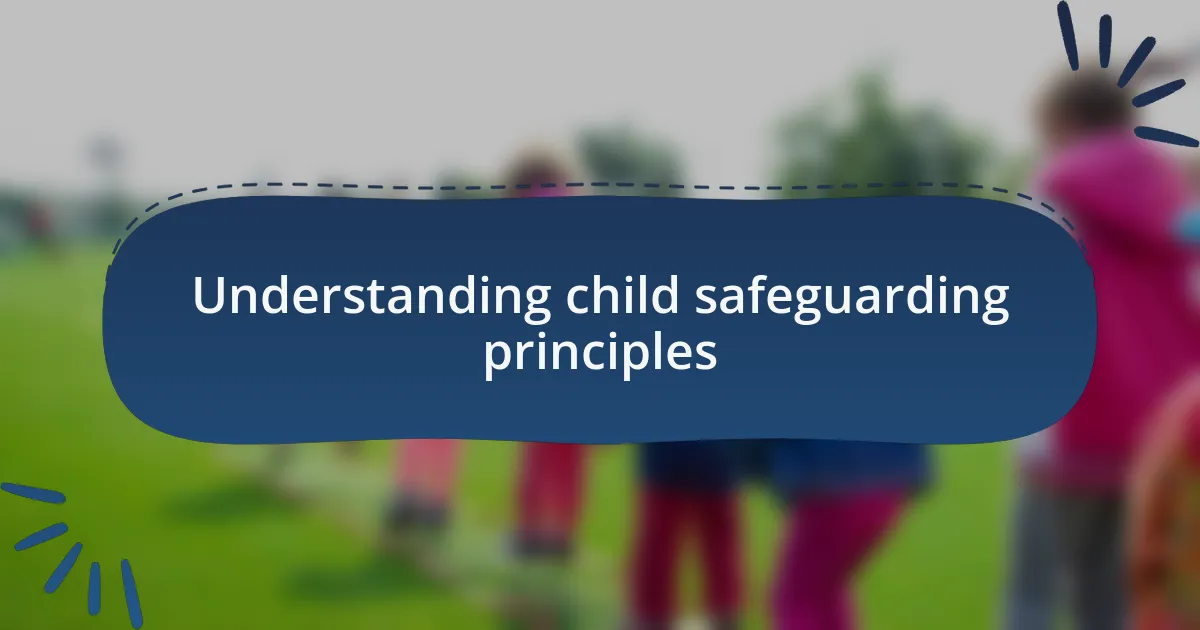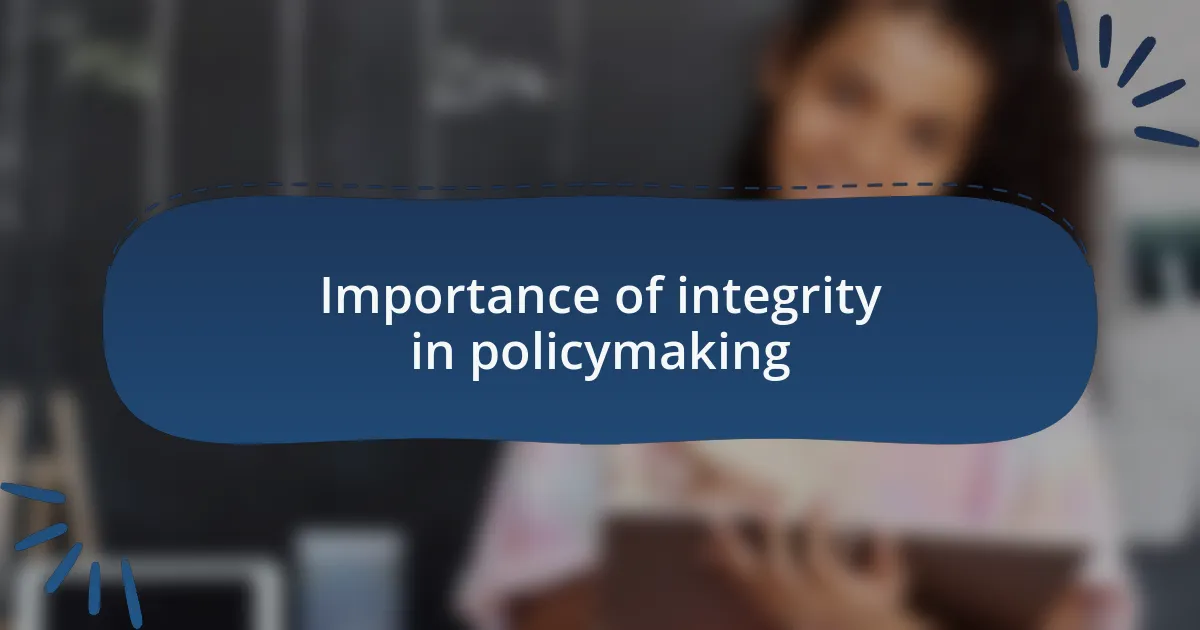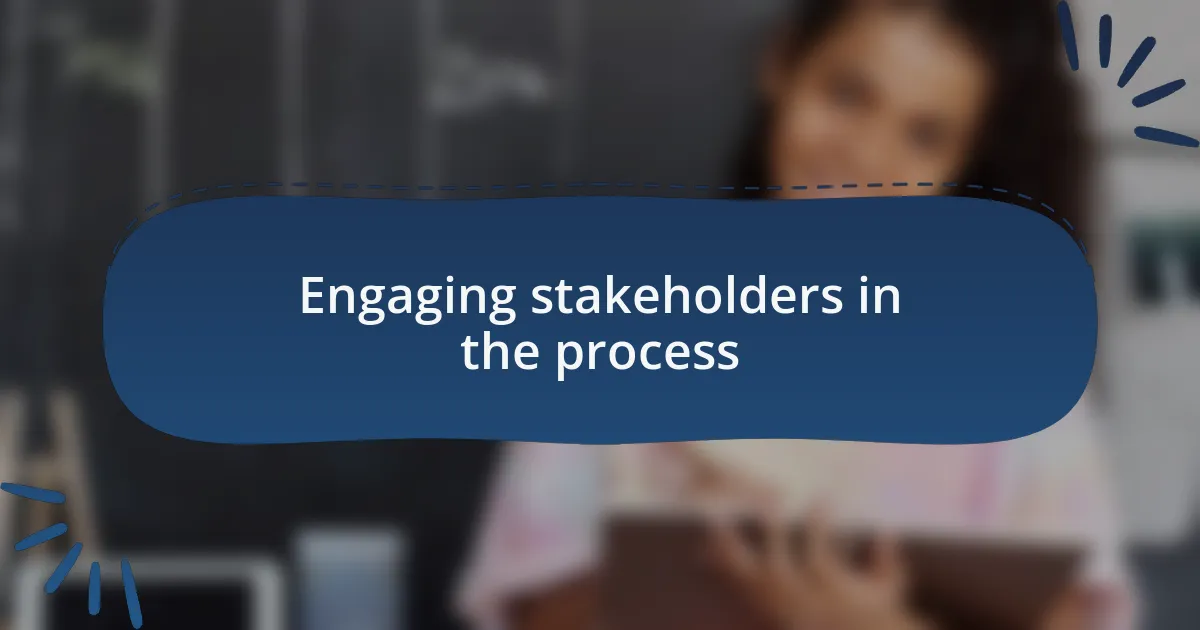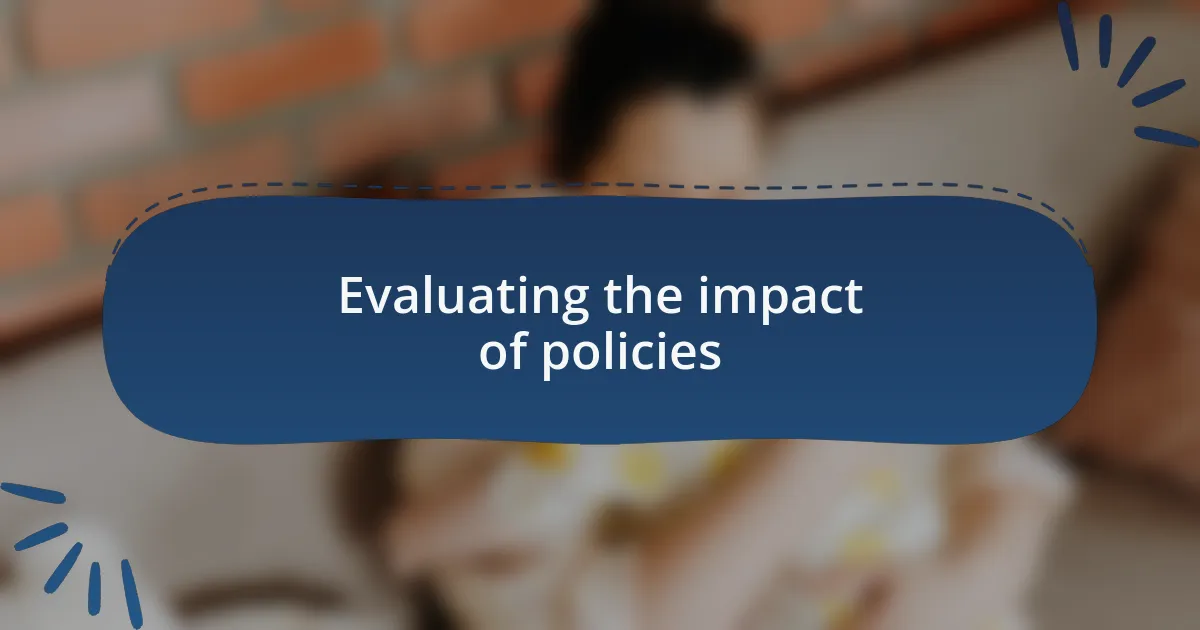Key takeaways:
- Child safeguarding principles prioritize the best interests of the child and the right to be heard, fostering effective policymaking.
- Integrity in policymaking builds trust among stakeholders and inspires community confidence, essential for child welfare.
- Engaging stakeholders and establishing clear communication channels enhances policy development and fosters a sense of ownership.
- Evaluating policy impacts quantitatively and qualitatively reveals insights that drive meaningful change, emphasizing personal narratives alongside statistics.

Understanding child safeguarding principles
Child safeguarding principles are essential in creating a protective environment for children. I recall a moment during my early career in policy development when I witnessed firsthand the impact of effective safeguarding practices. It was a stark reminder that these principles aren’t merely guidelines; they shape the lives and future of vulnerable children.
One fundamental principle is the concept of the best interests of the child. This principle emphasizes that every decision made should prioritize the health, safety, and well-being of the child. Have you ever thought about how easily these interests can be overlooked in policymaking? I believe that when we center our discussions and strategies around the child’s perspective, we can forge policies that truly resonate with their needs.
Another crucial aspect is the right to be heard. Children should have a voice in decisions that affect them. I’ve witnessed how empowering children to express their thoughts and concerns can lead to more effective outcomes. It fosters trust and transparency, and above all, it validates their feelings, reinforcing that they matter. How often do we really pause and listen to the children we aim to protect? By embracing this principle, we not only uphold our integrity in policymaking but also pave the way for more inclusive and effective child safeguarding policies.

Importance of integrity in policymaking
Integrity in policymaking is crucial, especially when it comes to child safeguarding. I remember a time when I was part of a policy review committee, and we faced a dilemma involving resource allocation. It was tempting to favor initiatives that promised quick results, but I stood firm in advocating for a transparent approach that genuinely prioritized children’s long-term welfare. It was a powerful reminder that maintaining integrity fosters trust among stakeholders, ensuring that every child is given the attention they truly deserve.
Moreover, policymakers who act with integrity inspire confidence in the community. There was an instance where a contentious policy was proposed, and I chose to openly engage with parents and children alike. By fostering candid discussions, the result was not only a more informed policy but also stronger community ties. Isn’t it fascinating how transparency and honesty can transform skepticism into support? In my experience, when we uphold integrity in our decision-making, we cultivate a culture of collaboration that ultimately benefits the children we serve.
Lastly, integrity serves as a compass during challenging times. I once faced pressure to compromise on a policy aimed at protecting vulnerable children due to differing opinions from influential stakeholders. Instead of caving in, I leaned on my conviction for transparent policymaking and prioritized the needs of the children. This experience reinforced my belief that unwavering integrity can be a guiding light, helping us navigate the murky waters of policymaking while ensuring that children’s best interests always come first. What greater responsibility do we have than to ensure that our choices reflect our commitment to safeguarding children’s rights and welfare?

Engaging stakeholders in the process
Engaging stakeholders in the policymaking process isn’t just a formality; it’s essential for creating a framework that supports children’s safeguarding effectively. I recall a project where I organized a series of workshops with teachers, community leaders, and parents. The differing perspectives we encountered not only enriched our policy discussions but also revealed insights I hadn’t considered before. Isn’t it incredible how much wisdom can come from those directly involved in child welfare?
Listening to the voices of stakeholders can also unveil blind spots in our proposals. One time, during a community forum, a concerned parent shared their story about navigating the system for their child’s needs. This discussion prompted us to revise our service delivery model, ensuring we were more inclusive and responsive. It reminded me that real change often starts from the grassroots level, where the experiences of families illuminate the path forward.
Moreover, fostering those relationships creates a shared sense of ownership among stakeholders. When I seen participants taking pride in the policy we developed together, it filled me with hope and excitement. How often do we engage those impacted by our decisions? I believe that genuine engagement strengthens our commitment to integrity and ultimately results in better outcomes for the children we aim to protect.

Establishing clear communication channels
Establishing clear communication channels is crucial in making sure that everyone involved feels heard and valued. I remember a time when we implemented a monthly newsletter to keep all stakeholders informed about ongoing initiatives. Seeing community members share their thoughts on the latest updates made me realize how much transparency strengthens relationships. Have you ever felt out of the loop? I believe that open lines of communication can stop that feeling before it even starts.
Additionally, creating accessible forums for discussion enhances trust. I recall hosting online Q&A sessions, where parents and guardians could express their concerns and ask questions directly. The feedback received during these sessions was incredibly enlightening. It’s fascinating how a simple platform for dialogue can transform apprehension into collaboration, isn’t it?
Lastly, utilizing digital tools for feedback can be a game-changer. I’ve found that anonymous surveys can encourage more candid responses, allowing those who might be hesitant to speak up face-to-face to share valuable insights. Each response helped us refine our policies, driving home the idea that when people feel safe to express themselves, we make strides toward truly effective child safeguarding.

Evaluating the impact of policies
Evaluating the impact of policies is a crucial step in ensuring that our child safeguarding efforts truly resonate with the community. I vividly remember a time when we reviewed a policy designed to improve reporting mechanisms for abuse. We conducted focus groups that underscored how the original policy was more complex than necessary, which surprised me. What if we hadn’t sought direct input? Would we have missed the opportunity for meaningful change?
It’s also essential to measure outcomes quantitatively and qualitatively. I’ve shared new metrics tracking the number of reports filed before and after implementing changes. An upward trend not only pointed to increased engagement but also reinforced my belief in the effectiveness of simplified processes. Have you ever tracked something only to discover trends you didn’t expect? These insights can often reveal where our policies fall short or shine, guiding future revisions.
Lastly, ongoing reflection on the emotional impact of our policies cannot be overlooked. I once spoke with a parent who articulated that a specific policy had given them the confidence to approach the system without fear. Listening to their story reminded me that the true impact of our work often lies in these personal narratives. How often do we pause to consider not just the numbers, but the lives behind them? Understanding these experiences has always encouraged me to advocate for policies that don’t just exist on paper but create real, lasting change.

Lessons learned from my experiences
One significant lesson I learned was the importance of listening actively. During a community meeting, a father shared how a policy we implemented inadvertently left out crucial support for families in crisis. It hit me hard; I realized that had I not taken the time to listen, we could have deepened existing pain instead of alleviating it. When was the last time you paused to truly hear someone’s experience?
Another important takeaway was the value of transparency. After a policy shift, I organized an open forum to discuss these changes, inviting feedback even from those who had previously felt unheard. I was taken aback by the warmth of the responses; people appreciated being included in the process. How empowering is it to feel like you have a seat at the table?
Finally, I learned that vulnerability can be a strength in policymaking. I remember candidly sharing my own uncertainties about a new initiative, which opened the door for honest conversations. This shared vulnerability fostered trust and allowed stakeholders to voice their concerns without fear, reinforcing my belief that integrity thrives in environments where honesty is embraced. Have you noticed how authenticity can transform discussions into collaborative efforts?